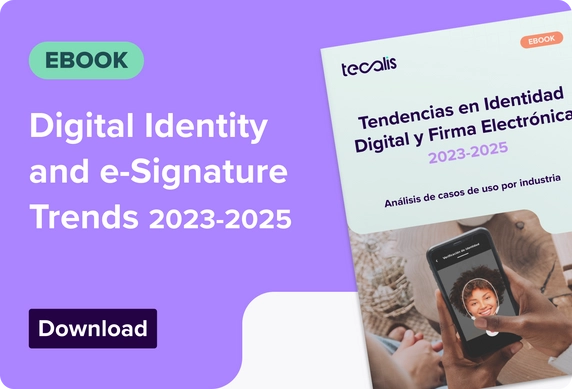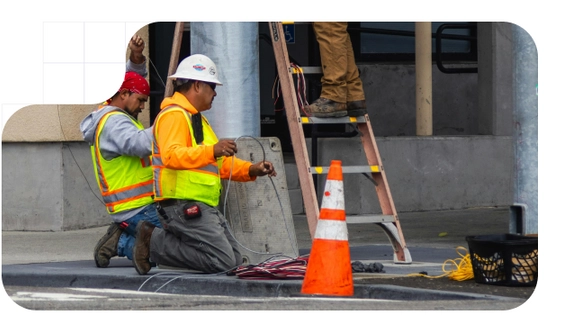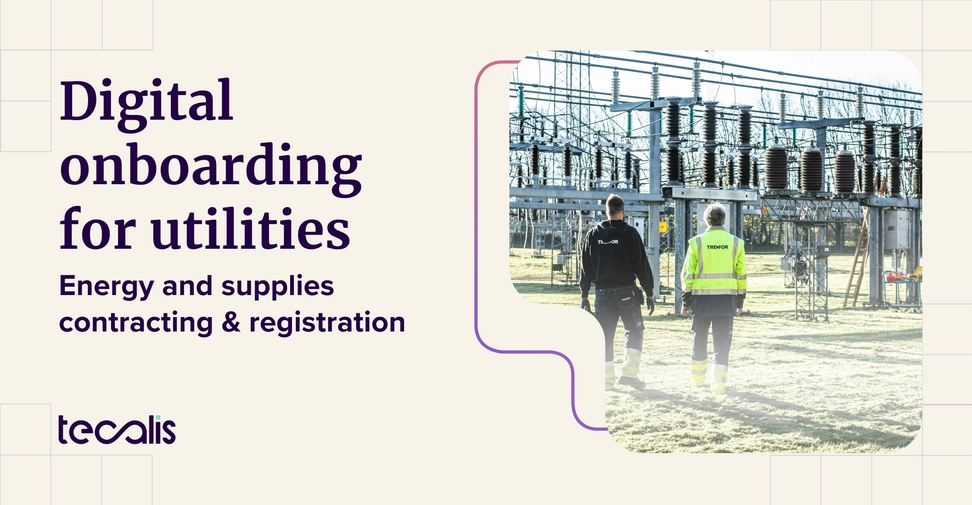Index
Get the latest news right in your inbox
The companies that supply and market electricity, gas and water services, etc., are undergoing an accelerated digital transformation process. The need to optimize customer-related processes, improve the experience of commercial agents and adapt to new regulations is driving the adoption of innovative technological solutions.
In utilities, where efficiency and customer experience are imperative, the implementation of digital onboarding solutions is fundamentally changing the way companies manage new customer onboarding. It is interesting to understand how digital onboarding solutions, which include customer onboarding processes with KYC (Know Your Customer) and e-signature (digital contracting), are transforming the utilities sector, addressing regulatory challenges, improving customer experience and optimizing operational efficiency.
In this context, Digital Onboarding emerges as a fundamental tool for companies in the sector. This process allows the registration of new customers online and remotely (via call center), secure and efficient by integrating technologies such as digital identification (KYC) and electronic signature. It is also useful to bring these tools to face-to-face sales and digitize the process.


Evolution of digital onboarding in utilities
In a context where customer expectations are increasingly high and competition is fierce, utilities companies are increasingly turning to RegTech solutions to streamline and simplify new customer onboarding processes. Traditionally, these processes used to be long and tedious, with a large amount of paper documentation and multiple stages of manual verification. In addition, customers found it difficult and complex to understand and review everything.
However, with the advent of digital technology, utilities are adopting innovative solutions that allow customers to complete the entire onboarding process remotely, from the comfort of their homes or with the tools a sales agent has on their device. These solutions use technologies such as e-signature and automated KYC with user identity verification to simplify the process, reduce onboarding time and improve the customer experience.
On the other hand, the utilities sector is undergoing a series of changes that have a direct impact on customer registration and contracting processes:
- Market liberalization: Increased competition requires more efficient differentiation and customer acquisition strategies.
- Digitalization: Implementation of new technologies to optimize customer experience and operational efficiency.
- Demand growth: Population growth and the need for energy services drives the attraction of new customers.
- New business models: Emergence of disruptive companies and new energy service offerings.
Regulation and standards in the utilities sector
The utilities industry is subject to strict regulations and standards that address all aspects of its operation, including the process of signing up and contracting customers. Companies must comply with a number of legal and regulatory requirements to ensure the security and protection of customer data, as well as to prevent fraud.
In this sense, RegTech solutions play a key role in helping companies comply with these regulations more efficiently and effectively. Implementing automated KYC processes ensures that customer information is collected and verified accurately and securely, complying with the regulatory standards set by the relevant authorities. Highlighting:
- Personal Data Protection Act and GDPR: Requires the protection of customers' personal information.
- Information Society Services Law: Regulates electronic contracting and electronic signatures.
- Sector-specific regulations: Specific regulations for the electricity and gas sectors, etc.
- eIDAS and PSD2/3: Regulations that directly affect digital and remote transactions of any kind, which involves much of the trading side of utilities.

Customer registration and contracting processes
The traditional process of registering a new customer in a utility company is usually complex and slow if the appropriate digital systems are not in place. It includes a series of processes and phases that, if not digitized correctly, can cause major problems for both users and companies.
- Face-to-face application: The client must go to a physical office to apply for registration if an online process with the legal guarantees provided by a RegTech is not available.
- Filling out forms: You must fill out forms with personal and financial information that is sometimes confusing or not readily available.
- Presentation of documentation: Submission of physical documentation such as ID card, rental agreement, deeds, proof of location, etc. must be done with anti-fraud controls, to avoid submission of forged documentation.
- Signing of contracts: The customer must sign the supply contracts.
The contribution of RegTech and specialized softwares
A prime example of such software used by utilities is Customer Hub, developed by Tecalis. Customer Hub is a comprehensive platform that offers advanced digital onboarding solutions within a global ecosystem with sales tools, including automated KYC and e-signature customer enrollment processes.
Identity verification is a crucial process in a number of situations within the utilities industry, where customers need to confirm who they are to access certain services or perform certain key operations. Below is a list of common use cases and operations where utility users and customers need to verify their identity:
- Registration of new services: When a customer wishes to contract a new service, such as electricity, gas, water, or any other utility service, it is necessary to verify your identity to complete the registration process.
- Change of ownership: In cases where the owner of a service changes, whether due to sale of the property or for any other reason, it is necessary that both the old and the new owner verify their identity in order to carry out the change of ownership of the service.
- Modification of personal information: If a customer needs to modify personal information associated with their account, such as billing address or contact information, identity verification may be required to process such changes.
- Requesting additional services or upgrades: When a customer requests additional services, such as the installation of a smart meter or the addition of special features to their service, an identity verification is likely to be required to authorize the request. It also occurs with cross-sale of joint products (in collaboration with other partner companies) such as taking out a subscription to a streaming service or a bank card alongside the energy contract.
- Request for contract changes: If a customer wishes to make changes to the terms and conditions of their utility contract, such as rate type or contract duration, an identity verification may be required to process the request.
- Incident or complaint reporting: In the event of incidents, such as outages, billing errors or damage to facilities, customers may need to verify their identity when reporting an incident or filing a complaint with the utility. For these types of cases, electronic notifications with digital signature tools are also essential for energy.
- Authorization of payments and direct debits: To authorize automatic payments or set up direct debits for payment of services, identity verification may be required to ensure the security and validity of financial transactions.
These are just a few examples of the use cases and operations in which utility users and customers need to verify their identity or make use of digital signatures. Identity verification is critical to ensure the security, privacy and integrity of utilities, as well as to prevent fraud and ensure regulatory compliance.

Marketing and sales of energy / utilities services
In the dynamic area of marketing and sales of energy and utilities services, efficiency and agility are critical to the success of companies in a competitive and constantly evolving market. In this context, Tecalis Customer Hub emerges as a comprehensive solution that revolutionizes the way utilities marketers manage their sales channels and marketing tools.
These BSSs offer a centralized platform that enables marketers to work on every stage of the sales process, from lead acquisition to conversion and post-sales customer loyalty. The platform provides a variety of tools and functionalities specifically designed to meet the unique needs of energy, light, water, gas and other utilities, with solutions such as:
- Lead management: The platform allows companies to capture and manage leads from a variety of sources, such as web forms, phone calls and status of hiring processes.
- Lead qualification: Tecalis Customer Hub helps companies qualify leads so that sales teams can focus on those most likely to buy, rescuing users who did not close a sale at one point of sale and referring them to others to try to complete the opportunity.
- Proposal creation: The platform allows sales teams to create and send customized proposals to customers and contract signature requests with all legal guarantees.
- Sales tracking: Customer Hub helps companies track sales progress and identify areas for improvement. Similarly, customers are offered a way to contact utility companies for help and assistance, which sales agents review through CH.
One of the key features of Customer Hub is its ability to efficiently and effectively manage sales channels, including direct sales, sales through external agents, online sales and more, enabling new points of sale to be activated in minutes to make customers in, for example, a shopping mall.
Benefits of digital onboarding in utilities
One of the main benefits of digital onboarding solutions in the utility industry is the significant improvement in user experience. By allowing customers to complete the entire onboarding process remotely and paperlessly, these solutions offer a more convenient and frictionless experience, which increases customer satisfaction and fosters brand loyalty.
In addition, digital onboarding solutions also contribute to improving the operational efficiency of utilities by reducing the costs and time associated with manual and paper-based processes. By eliminating the need for physical documentation and manual verifications, these solutions enable companies to save time and resources, while minimizing errors and increasing accuracy in data processing. As a summary of the results after implementing digital onboarding tools in utilities, we find:
- Agility: Significantly reduces the time it takes to sign up new customers, eliminating the need for face-to-face procedures.
- Security: Guarantees customer identification and authentication through KYC, preventing fraud and complying with regulations.
- Efficiency: Optimizes internal processes, freeing up human resources for more strategic tasks.
- Improved customer experience: Offers a simple, fast and travel-free sign-up process.
- Cost reduction: Reduces expenses associated with paperwork and manual management of registrations.
- Increased customer satisfaction: Facilitates interaction with the company and increases the perception of modernity and efficiency.
























